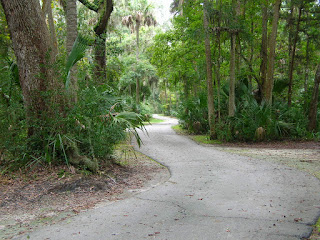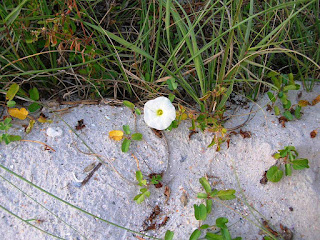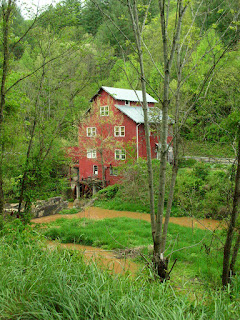What is it about the Civil War that
continues to fascinate Americans, almost 150 years after the fact? Much
more than a topic in schoolchildren's history texts, this grim period fires the
imaginations of re-enactors and scholars; even casual tourists flock to the
battlegrounds that dot the country's landscape. For many years, in my
mind the war was purely academic: a chronology of dates and a roster of names
to be committed to memory. My cousin Michael and my childhood friend
Clint Johnson were enthusiastic students of the war, so I figured it was just a
"guy thing." My first visit to Gettysburg changed my attitude
somewhat, and with the recent discovery that my friend Amy enjoys re-enactments,
well, there went my gender theory.
Because we are currently situated so
near to Fredericksburg and Spotsylvania and Chancellorsville, and everywhere we
drive there is another historical marker chronicling some aspect of the war,
I've begun questioning our collective Civil War fascination in earnest.
For clues I went to the Internet. One source suggested that people are
still interested because there have been films and documentaries on TV, and
people become curious about subjects they've seen on TV. I can't really
buy that one as the primary reason. Money for a television project is
generated by showing that the project will have popular appeal; thus interest
generates TV programming, not the other way around. Another source said that
this war captures our interest more than any other because the war was fought
over slavery. That strikes me as an over-simplification, both as to the
cause of the war and as to the reason for our interest.

Lacking any clear answers didn't
interfere with our going to the Fredericksburg Battlefield today! It was
Greg's first visit ever to a Civil War battlefield, and my first to this
particular one. We started at the Visitors' Center, to get an overview of
the battle and what we were likely to see. We marveled over the uniforms
on display, and how small of stature their wearers must have been. We
inspected guns and rifles and ammunition used in battle. We saw Bibles
and prayer books that had been found scattered about the battlefield in the
days following the fight. Eating utensils ... a drum ... sewing kits ...
old tintypes ...
... and then Greg quietly mused,
"You know, I can't keep from thinking, 'What a waste.'"
We continued to explore the museum's
artifacts and eventually headed out to the Sunken Road Walking Trail, walking
its entire length and ending up at the National Cemetery, and all along Greg's
words continued to haunt me: What a waste.
Later, after we'd returned to the
campground, Greg remarked that he understood why people want to visit and
preserve these battlefields. I immediately said, "Tell me," but
the understanding was more of an impression that he had, rather than something
which he could articulate. I turned my attention to uploading pictures
from my camera, selecting and captioning some for inclusion in this blog, all
the while remembering What a waste, and somehow, unwittingly, I stumbled
upon an answer to my question that, for now, satisfies me.
What separates the American Civil
War from any of the other wars we've fought is that we were fighting amongst
ourselves. Not Southerners against Northerners, nor slaveholders against
abolitionists, we were neighbor against neighbor, sometimes even brother
against brother. The war was fought in our own backyards and there were
very few families who did not directly suffer its effects. The American
Civil War was the first in which journalists reported from the front, so we
have first-person accounts; furthermore, we have photographic accounts, not
just idealized pictures drawn from someone's memory after the fact. And
we have all those artifacts: those Bibles and mess kits and tattered
photographs collected from our backyards that keep this war real and personal
still today. Television documentaries, most notably Ken Burns's "The
Civil War," certainly have had an impact on the surge in interest over the
last couple of decades. But it's the way Burns told the story -- through
letters and journals and other first-person accounts, rather than a dry
presentation of facts and figures -- that made the war real and personal.
I'll let the philosophers and
political scientists debate the real causes of the war, whether or not it was
necessary for the cessation of slavery, whether or not it led to improvements
in our society and government ... and whether or not it could happen
again.
After our sobering and
insightful visit to the Fredericksburg Battlefield, we had lunch at the nearby
Colonial Tavern. They bill themselves as the Home of the Irish Brigade,
and though none of the Irish Brigade could've actually spent an evening here,
it is a fine tribute to those Irish volunteers. It's about as
"authentic" as any pub I've ever visited. They know what Half
& Half is -- over the years I've learned to be shy about asking for one,
due to the blank stares -- if not downright insults -- I've endured. Greg
and I both opted for a lunch special: a generous helping of
"home-made" corned beef piled onto rye bread along with sauerkraut,
thousand island dressing and Dubliner cheese. Yum!

The sound of a drum can cut through the din of war -- through shouting and shooting and chaos. This drum was carried by the regiment first organized as the 28th Massachusetts Volunteer Infantry, later to be known as the Fourth Irish Regiment of the Second Brigade, First Division II Corps -- the "Irish Brigade." At Fredericksburg, the men of the Irish Brigade placed sprigs of green boxwood in their forage caps to distinguish them from all other units. Contemporary reports from Confederate officers note the good fight put up by the Irish Brigade, but the grim fact is that they sustained the highest number of casualties they would suffer in any single engagement of the war. The writing you see on the drum -- Faugh Ah Ballaugh -- is Irish for "Clear the way!"

This monument stands to Richard Rowland Kirkland, known to both Union and Confederate soldiers alike as "The Angel of Marye's Heights." A Confederate, Sergeant Kirkland risked his life to bring water and warm clothing to grievously wounded Union soldiers who had spent a bitterly cold night without water, food or medical treatment. Less than a year later, Kirkland himself would die at Chickamauga.
Brompton, standing high on a hill overlooking the battlefield, was mute witness to the Battle of Fredericksburg and served as a Union hospital after the Battle of the Wilderness. Today it is the official residence of the president of the University of Mary Washington.
From this vantage point, it's easy to see -- with 21st Century eyes and the distinct advantage of hindsight -- the futility of Burnside's attacks against Lee's forces.
Over 15,000 Union dead, the casualties of several different battles in the area, are buried at Fredericksburg National Cemetery. Confederate soldiers are buried elsewhere in Fredericksburg and in Spotsylvania Confederate Cemetery.






















